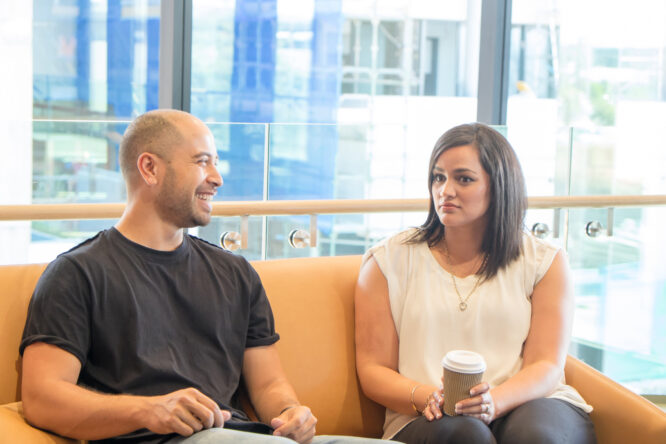Trust is one of those things people rarely talk about directly, but you can definitely feel it when it’s not there.

While some people are open about their boundaries, others send quieter signals that they’re not quite sure about you yet—or at all. If someone seems distant, guarded, or hard to read, these subtle behaviours might be their way of saying, without saying, that trust hasn’t fully been built. That’s not to say that you won’t be able to change the situation, but it may be a bit of an uphill battle.
1. They only share surface-level details with you.

Conversations stay light and impersonal. You might know where they work or what they watched last weekend, but not much else. They never really open up or let you in beyond the basics. Distancing themselves in that way can be their way of keeping you at arm’s length. If someone doesn’t trust you yet, they’re not going to hand over the deeper parts of their life or feelings easily.
2. They double-check what you say with other people.

Even if you’ve never given them a reason not to believe you, you might notice they ask a third person to confirm something you’ve already told them, or they act like they need to verify things more than once. It’s not always overt, but it’s there. It’s incredibly frustrating, especially if you’re being honest (and you should be). Of course, for someone who doesn’t fully trust you, relying solely on your word doesn’t feel like a safe bet.
3. They hesitate to leave you alone with people close to them.

Whether it’s friends, a partner, or family members, they seem weirdly protective about who you spend time with when they’re not around. It’s subtle, but it feels like they’re guarding something. This usually comes from a fear you’ll say or do something they wouldn’t approve of—or worse, something that changes how other people see them. It’s often more about control than comfort.
4. They keep conversations short and redirect quickly.

Every time you try to go deeper, they steer the conversation elsewhere. They might change the subject, make a joke, or end the chat before things get real. When someone doesn’t trust you, vulnerability feels unsafe. Redirecting is their way of staying in control of what you know and avoiding topics they’d rather keep private. They like talking to you, but trusting you with stuff that matters to them is a no-go, at least for now.
5. They avoid eye contact when things get personal.

They’re fine with casual eye contact, but the moment you start talking about anything real, their gaze shifts away. They look at their phone, scan the room, or suddenly seem distracted. To be fair, that can be an unconscious defence mechanism. Eye contact is a powerful connection tool, and someone who’s feeling wary might avoid that closeness when emotions come into play.
6. They never ask your opinion on anything meaningful.

They might talk about their own life, but they never ask what you think about something personal or important. There’s no back-and-forth, just surface-level updates. When trust is lacking, people won’t risk being influenced by your views, or let you weigh in on their choices. They keep that emotional door closed, even if everything looks fine on the outside.
7. They keep their boundaries extra firm around you.

Boundaries are healthy, but if someone treats you differently than they do everyone else—more rigid, less flexible, and less open—it could be a trust issue rather than a personality trait. It might show up in how much access they give you, what they share, or even how quickly they respond. If it feels like there’s a wall there, there probably is. It doesn’t feel very nice, that’s for sure.
8. They rarely show vulnerability around you.

They never admit when they’re struggling, never talk about hard days, and always keep things upbeat, even when it’s obvious something’s wrong. Everything stays on the surface. It can mean they don’t trust you to hold space for their emotions. Whether it’s fear of judgement or past experience, they’ve decided it’s safer not to let you in too far. They have plenty of depth, they’re just not willing to let you see it.
9. They only interact with you in group settings.
 Source: Unsplash
Source: Unsplash One-on-one hangouts never seem to happen. They’re friendly at group dinners or parties, but never make an effort to connect on a more personal level outside of those moments. Keeping their distance and avoiding being on their own with you can suggest they don’t feel comfortable getting closer. Keeping it social and casual gives them control over the dynamic while maintaining emotional distance.
10. They deflect when you offer support.
 Source: Unsplash
Source: Unsplash Anytime you offer help or ask how they’re doing, they brush it off or change the subject. It’s not just modesty; it’s a sign they’re not ready to let you in. When people don’t fully trust someone, accepting emotional support can feel risky. They might worry you won’t really show up, or that they’ll owe you something they’re not ready to give.
11. They carefully control what you know about their life.
 Source: Unsplash
Source: Unsplash You find out bits and pieces, but never the full picture. Everything feels curated, as if you’re only getting the version they’re comfortable sharing. It’s like they’re editing themselves for your benefit. This might come from a place of caution. If someone isn’t sure how you’ll respond to their real story, they might give you the version that feels safer, even if it’s not fully authentic.
12. They’re vague about their feelings or opinions around you.
 Source: Unsplash
Source: Unsplash They don’t let you know what they really think, especially when it comes to sensitive topics. They keep their responses neutral, even when you know they probably have a stronger view. That might mean that they’re not sure where you stand—or they don’t trust you not to judge them. By staying vague, they protect themselves from feeling exposed or misunderstood.
13. They rarely return emotional energy in conversations.

You might open up, share your thoughts, or express something personal… and get a pretty flat or distant response in return. They keep the energy one-sided, even if they’re polite about it. When someone’s unsure of your intentions or still deciding how safe you are, they’ll hold back. They’re watching, listening, but not yet ready to match your emotional openness.
14. They include other people in decisions that only involve the two of you.

Instead of discussing things directly, they loop in a friend, bring up what someone else thinks, or avoid making a choice without outside input. It feels like they need backup, and maybe they feel like they do. That behaviour can show that they don’t fully trust your perspective or your intentions. Including other people makes them feel more secure, but it can also reveal where the disconnect lies.
15. They keep a noticeable emotional distance, even when you’re trying to get closer.

They might enjoy your company, laugh at your jokes, and seem friendly, but it stops there. The relationship stays stuck in one gear, no matter how much time you spend together. That could mean they’re not ready to trust—or they’ve already decided not to. Either way, they’re choosing to keep things light and low-risk for a reason.
16. They act differently with you than they do with people they clearly trust.

Watching how they behave with other people says a lot. If they’re more relaxed, more open, or more affectionate with other people, that contrast can be hard to miss. Sometimes the most telling sign of low trust is what they give to other people that they don’t give to you. It doesn’t always mean you’ve done something wrong, but it does mean the connection isn’t quite there yet.




